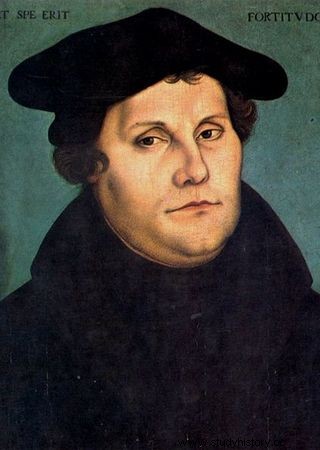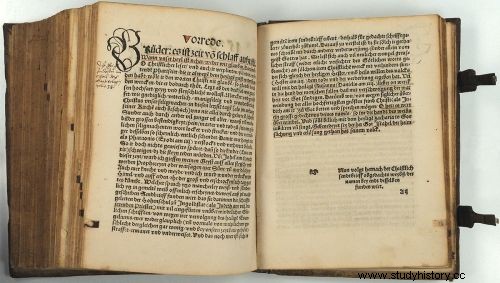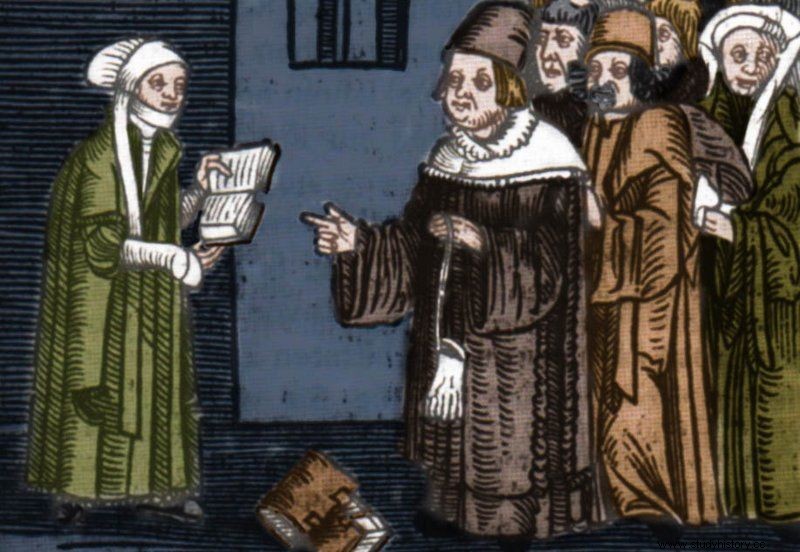Her husband was pressured to brick her in the wall, or at least cut off his fingers, making it difficult to write. Luther initially encouraged her to continue creating, but soon realized that his female competition was growing. Who is it about?
The most active woman in the German Reformation was a certain Argula von Grumbach - a Bavarian noblewoman, an excellent expert in the Bible, a correspondent friend of Luther, Osiander and Jerzy Spalatyn. She was well aware of the controversies surrounding the figure of the father of the Reformation, and she sometimes instructed in the letters of the rulers - the Saxon prince Frederick and the palatine of the Rhine Jan.
Women's Reformation
Although she did not know Latin, she developed her own theology, which initially aroused a lot of interest. Its guidelines were actually very simple. Maria Bogucka in the article "The Reformation and the Counter-Reformation and the position of women at the threshold of the modern era" wrote:

One of Argula von Grumbach's acquaintances was the father of the Reformation, Martin Luther himself.
Scripture was based on it; she was characterized by aversion to the clergy, but she did not deny the existence of saints, for example, on the contrary, she valued reading their lives. So she did not approve of all the assumptions of the Reformation.
Her ideas were not as radical as, for example, Luther's, and kept aspects of religiosity close to common people. No wonder that its publications have even been reprinted several times.
Argula's activity was remarkable even for the first half of the 16th century - a period when women in the public sphere were particularly awakened. Researcher of the beginnings of the Reformation, Paul Russel concluded that nearly 1/3 of all religious pamphlets created in the years 1523-1524 he analyzed were written by women.
Argula von Grumbach herself was the author of at least eight different published texts - so many have survived to our times.
"A woman's place is in the kitchen"
How did scholars, clergy, and other promoters of religious change react to the reformer? Not the best. After she advocated the active role of women in the Church, scholars from the University of Ingolstadt sent her to the kitchen and distaff. This, however, did not discourage the brave noblewoman at all.

Argula von Grumbach was not only a great thinker, but also the first woman to have her work published in print in Protestant Germany.
A stormy discussion began, in which various voices were heard. Bogucka reported:
the polemic (…) outraged many people in Germany and frightened some; the prophecies of Jeremiah that had foretold that women would be called to prophesy before the Day of Judgment were recalled. Pressure was put on Argula's husband to silence his wife, suggesting, for example, that he cut off her fingers, making it difficult to write, or that he wall her up, thus excluding her from the world.
It quickly turned out who had the stronger character - Argula stood up to her husband and soon there was a separation. When the unfortunate spouse died, the reformer remarried. And this time her chosen one lived extremely briefly.
For Argula, this was a decree most beneficial:as a widow, she was free to devote herself to her activities. She practiced propaganda and politics, and she gave her sermons, among others, in cemeteries during funerals. Above all, she emphasized that genders, classes, etc. are equal: Both the woman and the peasant receive the gifts of the Holy Spirit.

Argul von Grumbach while explaining the Scriptures (colorization:RK).
Luther is afraid of competition
At first, Argula's enthusiasm met with the approval of Luther, who praised her in 1523 and encouraged her to continue writing. Soon, however, the father of the Reformation noticed that he was growing in dangerous competition. He even began to emphasize more than before that women are weaker creatures and to make fun of "a colleague". He jokingly stated: What if a woman wanted to preach in church? What a hustle and bustle there would be!
Although Argula's theology was not caught on and was quickly forgotten, Luther received an answer to his question posthumously. More and more Protestant communities not only ordain women priests, but even ordain them bishops. About hustle and bustle in the Lutheran communities of Sweden or Germany, the media did not say anything ...
Source:
Trivia is the essence of our website. Short materials devoted to interesting anecdotes, surprising details from the past, strange news from the old press. Reading that will take you no more than 3 minutes, based on single sources. This particular material is based on:
- Maria Bogucka, The Reformation and Counter-Reformation and the position of women on the threshold of the modern era , Semper, Warsaw 2008, pp. 430-443.
